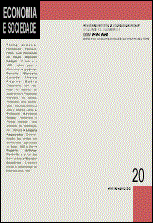Resumo
O artigo discute os procedimentos intelectuais presentes na construção da ortodoxia econômica. A tentativa – empreendida por Senior, Jevons e Walras – de dar “fundamentos científicos” à reflexão econômica se apóia em uma abstração indevida: a relação entre as necessidades individuais e as dotações da natureza. O “cálculo de prazer e dor” de Bentham, as “proposições gerais” de Senior, as “leis referentes aos casos individuais” de Jevons e a “satisfação máxima das necessidades” de Walras se baseiam na análise das motivações e comportamento dos indivíduos, isolados de seu meio social. O resultado é a entronização da utilidade, a criação do Homo Oeconomicus, a conversão da Economia Política em “Economia Política Pura” e a construção de um edifício teórico onde as relações e as categorias econômicas são completamente esvaziadas de seu conteúdo social e histórico. A dimensão social da vida econômica se dissolve, tragada pela voracidade naturalista da “Ciência Econômica”. Walras, através do modelo de equilíbrio geral, pretende dar fundamentação matemática à suposição de que o “mundo dos interesses econômicos tende a se ordenar por si próprio”, da mesma maneira que o “mundo dos movimentos astronômicos”. Nasce, assim, a idéiamãe do mainstream: os agentes maximizadores, operando em liberdade, inexoravelmente produzem o “global market clearing”.
Abstract
This article discusses the intellectual procedures underlying the building of economic orthodoxy. The attempt of Senior, Jevons and Walras to provide “scientific fundaments” to economic reflection rests on an improper abstraction: the relationship between individual needs and nature’s endowments. Bentham’s “calculation of pain and pleasure”, Senior’s “general propositions”, Jevons’ “laws relating to individual cases”, and Walras’ “maximum satisfaction of the needs of society” are based on the analysis of the motivation and behavior of individuals isolated from their social environment. The result of this approach is the exaltation of utility, the creation of the Homo Oeconomicus, the conversion of Political Economy into “Pure Political Economy”, and the construction of a theoretical building where relationships and economic categories are completely drained of their social content. The social dimension of economic life is dissolved, engulfed by the naturalistic voracity of “Economic Science”. Walras, through his general equilibrium model, sought to establish mathematical foundations for his supposition that the “world of economic interests tends toward spontaneous order” in the same way as “the world of astronomical motion”. This led to the idéemaitresse of the mainstream: left free to act, the maximizing agents will inexorably produce a global market clearing condition.
Key words: Senior, Nassau William, 1790-1864; Jevons, William Stanley, 1835-1882; Walras, Leon, 1834-1910; Orthodoxy; Orthodox thought.
Referências
CANUTO, Otaviano. O equilíbrio geral de Walras. In: CARNEIRO, R. (Org.). Os clássicos da economia. São Paulo: Editora Ática, 1997. v. 1, p. 207.
DEFOE, Daniel. As aventuras de Robinson Crusoé. Porto Alegre: L & PM Editores, 1997.
JEVONS, S. A teoria da economia política. São Paulo: Abril Cultural, 1983.
________. In: METHODOLOGY of economics: 19th Century British Contributions. Routledge: Thoemmes Press, 1997. v. 5: Historical Economics: 1870-1907.
________. In: METHODOLOGY of economics: 19th Century British Contributions. Routledge: Thoemmes Press, 1997. v. 6: Theoretical Economists: 1876-1914.
SCHUMPETER, J. A. Historia del análisis económico. Barcelona: Ediciones Ariel, 1971.
SCREPANTI, Ernesto, ZAMAGNI, Stefano. In: METHODOLOGY of economics: 19th Century British Contributions. Routledge: Thoemmes Press, 1997. v. 5: Historical economics: 1870- 1907, p. 91-93, 161-162, 170-172.
SENIOR, W. Nassau. An introductory lecture on political economy, delivered before the University of Oxford on the 6th of December, 1826. In: METHODOLOGY of economics: 19th Century British Contributions. Routledge: Thoemmes Press, 1997a. v. 4: Classical economics 1827- 1860.
________. Outline of the science of political economy (1836). In: METHODOLOGY of economics: 19th Century British Contributions. Routledge: Thoemmes Press, 1997b. v. 4: Classical economics 1827-1860.
WALRAS, Léon. Compêndio dos elementos de economia política pura. São Paulo: Abril Cultural, 1983.
A Economia e Sociedade utiliza a licença do Creative Commons (CC), preservando assim, a integridade dos artigos em ambiente de acesso aberto.

